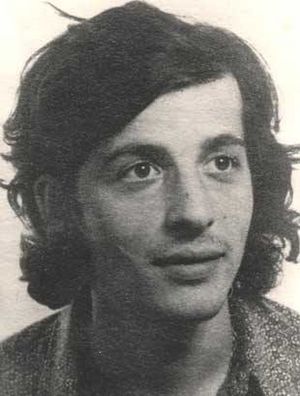Salvador Puig Antich facts for kids
Quick facts for kids
Salvador Puig Antich
|
|
|---|---|

Undated photo of Salvador Puig Antich
|
|
| Born | 30 May 1948 Barcelona, Spain
|
| Died | 2 March 1974 (aged 25) Barcelona, Spain
|
| Cause of death | Execution by garrote |
| Conviction(s) | Murder |
| Criminal penalty | Death |
Salvador Puig Antich (Catalan pronunciation: [səlβəˈðo ˌpudʒ‿ənˈtik]; born May 30, 1948 – died March 2, 1974) was a young Spanish activist from Catalonia. He was part of a group that challenged the government of Francoist Spain, a time when Spain was ruled by a dictator named Francisco Franco.
His execution, after being found guilty in connection with a bank robbery and the death of a police officer, caused a lot of public discussion. Many people in Catalonia, who wanted their region to have more self-rule, saw his death as a symbol of their struggle. His name became well-known in Barcelona. His story inspired artists like Joan Miró and Antoni Tàpies, and a play by the Catalan theater group Els Joglars. The 2006 movie Salvador tells the story of his time before his execution.
Contents
The Iberian Liberation Movement
Salvador Puig Antich was born in Barcelona, Spain. He first joined a group called the Workers' Commissions. Later, he became a member of the Iberian Liberation Movement (MIL). This group carried out armed robberies against banks. They called these actions "expropriations." They said they used the money to fund their activities against the Francoist government in the early 1970s.
After some of these robberies, Salvador was arrested. He was accused of being involved in the death of a police officer during a shootout. A military court sentenced him to death. He was to be executed by a method called the garrote vil, which was used in Spain at the time. This execution took place in the Model prison.
Many people around the world protested his sentence. Despite these protests, his execution went ahead. It was only the second state execution in Spain in eight years. University students in Barcelona and Madrid went on strike to protest. They even had clashes with the police.
The Execution of Georg Michael Welzel
On the same day as Salvador Puig Antich, another person was executed in Tarragona. His name was Georg Michael Welzel. He was from Cottbus in what was then East Germany. He was also charged with killing a policeman. He was known as Heinz Ches because he claimed that was his name and that he was Polish.
Many people believed that the Francoist government executed Georg Michael Welzel, who was seen as a common criminal, to make Salvador Puig Antich's execution seem less important. Puig Antich was seen as a political activist.
Salvador Puig Antich's Legacy
Many Catalonians saw Salvador Puig Antich's execution as a harsh response to their region's desire for self-rule. This led to public protests. He was one of the last revolutionaries executed by Franco's government. Because of this, Salvador Puig Antich became a very famous name in Barcelona. A group called the Groupes d'action révolutionnaires internationalistes (GARI) was formed to get revenge for his death.
Years after his execution in 1974, a Catalan theater group called Els Joglars performed a play. It was called La torna (The Return). This play, from 1977, was a satire against torture. It was based on the executions of both Puig Antich and Heinz Ches. Even though Franco's rule and its censorship laws had ended, some members of Els Joglars were put in jail or had to leave the country. Theater groups across Spain protested this.
Catalan painters Joan Miró and Antoni Tàpies both created art inspired by Puig Antich's execution in the mid-1970s. Miró's artwork, The Hope of a Condemned Man, shows a line that "sighs and falls with faltering resignation." Tàpies's series of prints called Assassins was also inspired by Puig Antich's death and Spanish politics. The 2006 film Salvador shows the time Salvador Puig Antich spent on death row.
In 2007, Salvador's family tried to have his case reviewed by the Spanish Supreme Court. The court rejected their request. However, in 2013, a judge in Argentina took on his case. This was done under a legal idea called universal jurisdiction. This means that some serious crimes can be judged in any country, no matter where they happened.
Salvador Puig Antich is buried in the Montjuïc Cemetery in Barcelona.
See also
 In Spanish: Salvador Puig Antich para niños
In Spanish: Salvador Puig Antich para niños
- Margalida Bover
 | Charles R. Drew |
 | Benjamin Banneker |
 | Jane C. Wright |
 | Roger Arliner Young |

